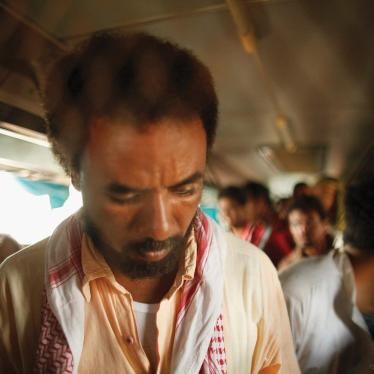UPDATE (May 30, 2021): Qatar's Government Communications Office stated that the Public Prosecution charged Malcolm Bidali with offenses related to “payments received by a foreign agent for the creation and distribution of disinformation within the State of Qatar,” but did not reveal additional details about his detention.
(Beirut) - Qatar’s state security services forcibly disappeared a Kenyan labor rights activist, Malcolm Bidali, on May 4, 2021, five human rights and labor rights organizations said today. More than three weeks later, Authorities are still refusing to reveal his whereabouts or explain why he has been detained. In a phone call to his mother on May 20, Mr. Bidali said he was being held in solitary confinement for 23 hours a day and that he had no access to a lawyer.
Migrant-Rights.org, FairSquare, Amnesty International, Human Rights Watch, and the Business & Human Rights Resource Centre are urging the Qatari authorities to immediately release Mr. Bidali, who appears to have been detained for the peaceful exercise of his human rights. They said:
“The Qatari authorities have not responded to repeated appeals for information, made by Malcom Bidali’s mother and by our organizations. Weeks after he was taken from his home, Mr. Bidali’s whereabouts remains a mystery. There is no evidence that he is being detained for anything other than his legitimate human rights work - for exercising his freedom of expression, and for shining a spotlight on Qatar’s treatment of migrant workers.
“If the authorities do have credible evidence that Mr. Bidali has committed an internationally recognizable crime, he must be brought before a judge to be charged and given a fair trial. Otherwise, he must be immediately and unconditionally released.”
Phishing attack
Malcolm Bidali tweets about labour abuses in Qatar using a pseudonym. On April 26, a Twitter user tagged Mr. Bidali in a tweet containing a graphic which Human Rights Watch had used for an August 2020 report about wage abuse in Qatar. The tweet also contained what appeared to be a YouTube link to a Human Rights Watch publication.
However, according to Amnesty International’s analysis, the link led to a suspicious URL capable of recording the IP address and other data about the person who clicked on it. This is a social engineering tactic known as phishing, and may have been used to identify or locate Mr. Bidali.
State security forces seized Mr. Bidali from his home on May 4, barely a week after the phishing attack.
“Though we cannot confirm who was responsible for the phishing attack on Malcolm Bidali, his arrest shortly afterwards suggests he was targeted for his activism,” the organizations said.
“Malcolm Bidali is a rare voice speaking out against the abuse of migrant workers in Qatar, and his forcible disappearance will have a chilling effect on freedom of expression. When one of the only workers who has spoken publicly in defence of migrants’ rights in Qatar is targeted like this, it creates a climate of fear and serves as a warning to other activists.”
On May 12, Qatari authorities acknowledged that Mr. Bidali was in their custody, but refused to say where he was being held or why. Until Mr. Bidali’s location is revealed, and until he is either taken before a court to face recognizable charges or is released, his detention continues to constitute an enforced disappearance.
On May 20, Qatari state security services allowed Mr. Bidali to call his mother, Maggie Turner, following an intervention by the Kenyan Ambassador in Qatar. In the 10-minute phone call, Bidali assured his mother that he had not been harmed, but was unable to tell her where he was being held or why. He also said that two guards were present as he made the call.
“While it is a huge relief to know that Malcolm is alive, the lack of information is hard to bear,” Maggie Turner said. “The fact that he is in solitary confinement is extremely concerning.”
Migrant-Rights.org, FairSquare, Amnesty International, Human Rights Watch, and the Business & Human Rights Resource Centre said:
“Enforced disappearance is a crime under international law, and prolonged solitary confinement can constitute torture. We reiterate our call on the Qatari authorities to immediately reveal the whereabouts of Malcolm Bidali, remove him from solitary confinement, and grant him access to an independent lawyer.”
Background Information
Malcolm Bidali, a 28-year-old Kenyan national, is a security guard, blogger and activist, who has been vocal about the plight of migrant workers like himself, and has written for a number of online platforms. A week before his arrest, he gave a presentation to a large group of civil society organizations and trade unions about his experiences working in Qatar.
On May 4, Qatar’s security services took Bidali from his living quarters for questioning. On May 12, Qatari authorities confirmed that he was in custody, but refused to disclose his location. Authorities have permitted Bidali consular access, and allowed him to call his mother briefly on May 20. The authorities have brought no charges against him, and continued to deny him access to legal representation.
An enforced disappearance is a crime under international law, which, according to the Convention on Enforced Disappearances, occurs when any person is arrested or otherwise detained by agents of the state, “followed by a refusal to acknowledge the deprivation of liberty or by concealment of the fate or whereabouts of the disappeared person, which place(s) such a person outside the protection of the law.”
Under international law, as reflected in the UN Standard Minimum Rules for the Treatment of Prisoners (the Nelson Mandela Rules), solitary confinement can be used “only in exceptional cases as a last resort, for as short a time as possible”. Further, as the UN special rapporteur on torture described in 2020, prolonged solitary confinement of more than 15 consecutive days is considered a form of torture.
As a state party to the International Covenant on Civil and Political Rights, Qatar is obligated to ensure that everyone has the right to due process, and that no one is arbitrarily detained or subjected to torture or to cruel, inhuman or degrading treatment or punishment.
Furthermore, under the UN Declaration on Human Rights Defenders, governments must actively protect human rights defenders from harm. They have an obligation to put in place social and legal structures to create environments that are safe and supportive for human rights defenders to carry out their work.








